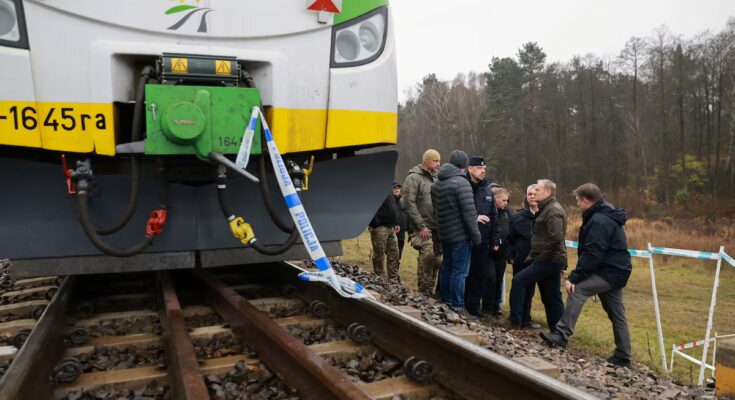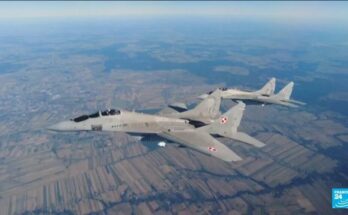The railway line connecting Warsaw, the capital of Poland, with Lublin in the south-east of the country suffered an explosion on Sunday that the Polish prime minister, the liberal conservative Donald Tusk, described as “an unprecedented act of sabotage that directly threatens the security of the Polish state and its citizens”. The government has not yet identified culprits or suspects, but Tusk highlighted this in a publication on the social network
A police statement said none of the 475 passengers carried by the train whose driver detected the damaged tracks were injured. The Internal Security Agency is cooperating with the police, the Prosecutor’s Office and the railways in the investigation, its head, Minister Tomasz Siemoniak, said.
However, the shadow of the Kremlin hovers over the sabotage, even if the incident, which occurred on Sunday near the town of Mika, about 100 kilometers south-east of the capital, is under investigation and the government remains cautious. Deputy Interior Minister Maciej Duszczyk even asked the population not to automatically blame Russia for every incident of this kind that has accumulated in Poland in recent years. “Russia is not so powerful as to provoke every fire, every situation of this kind,” he said in statements to the Polsat network, although he added that it “cannot be ruled out” that Moscow is involved.
Former Interior Minister Bartlomiej Sienkiewicz and the MEP from Tusk’s party Civic Platform took direct aim at Russia in an interview on private channel TVN24 on Sunday. The sabotage, he assured, “could indicate a new form of hybrid war between Russia and Poland.” “Not a month goes by without Russia committing some kind of aggression against people recruited by the Russian security services,” Sienkiewicz said.
NATO is closely monitoring the situation. “We are in close contact with the Polish authorities, the contact is intense but now we have to wait for the outcome of the investigations,” said NATO Secretary General Mark Rutte, after receiving Finnish President Alexander Stubb at the Alliance’s headquarters. Silvia Ayuso reports it.
Since Russia began its full-scale invasion of Ukraine in February 2022, Poland has been one of the most assertive countries against Moscow. Both the previous Executive, led by the ultra-conservative Law and Justice party, and the current one, Tusk’s liberal coalition, have defense as their priority. Poland, convinced that its country, for historical and geographical reasons, is one of the most exposed to the Russian threat, leads NATO’s military spending and aspires to invest 5% of GDP in this area in 2026.
As the media recalls Notes from PolandIn 2023, authorities arrested 16 members of a group that operated on behalf of Russia and planned, among other things, to attack trains carrying aid for Ukraine with explosives. In recent years there have also been a good number of sabotages, including arson, cyber attacks and other acts classified as hybrid attacks that are difficult to attribute, but the most serious recent incident clearly attributable to Russia was the intrusion into its territory of around twenty drones, which Moscow uses to attack Ukraine, in September.
Tusk does not miss the opportunity to highlight that the country is in a pre-war period and in the most dangerous moment since the Second World War. Polish Army Chief of Staff General Wieslaw Kukula said in a radio interview along the same lines on Sunday that “the adversary is preparing for war.” “They are creating an environment here whose goal is to create favorable conditions for possible aggression on Polish territory,” he continued.



